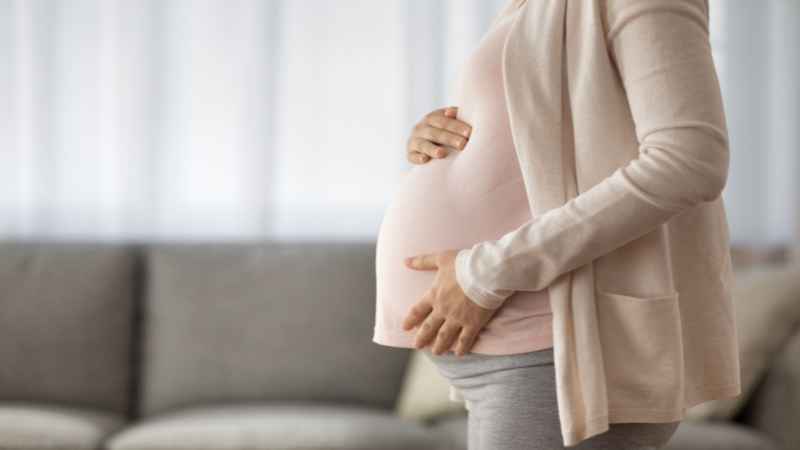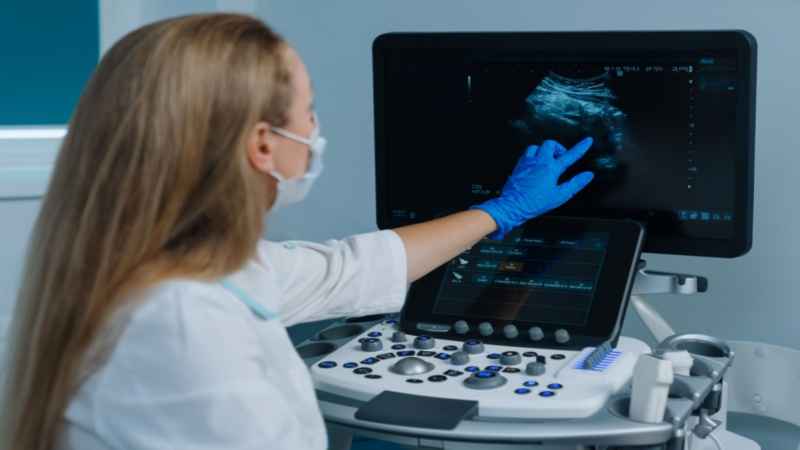 A placenta is a fascinating structure that nourishes us long before we take our first breath in the outside world. This wonderful organ acts as a lifeline between the mother and the fetus inside the womb. Sometimes, there can be a few fluid-filled spaces present inside the placenta that may look like lakes.
A placenta is a fascinating structure that nourishes us long before we take our first breath in the outside world. This wonderful organ acts as a lifeline between the mother and the fetus inside the womb. Sometimes, there can be a few fluid-filled spaces present inside the placenta that may look like lakes.
They are known as Placental lakes, which is usually a normal radiographic finding. However, some women might freak out knowing about its diagnosis. Read along more to learn about placental lakes and how they can affect your pregnancy journey.
What Are Placental Lakes?
Placental Lakes are vascular spaces or pools of blood within the placenta [1]. They are well-demarcated spaces that appear darker than the surrounding placental tissue. They are usually present in different shapes and sizes and normally contain maternal venous blood [2]. In most cases of pregnancy, they can be normally present. However, its presence in early pregnancy might signal fetal growth restriction. They can also go hand in hand with certain other placental complications. The different names of placental lakes are placental venous lakes, placental caverns, and placental sonolucency[3].
Are Placental Lakes Dangerous During Pregnancy?

Many experts believe that the presence of placental lakes does not cause many adverse effects during pregnancy. However, the risks of placental lakes during pregnancy depend upon the size of the blood pools. Usually, small placental lakes less than 5 cm are not considered dangerous during pregnancy. However, large placental lakes, measuring more than 5 cm in size, can sometimes lead to adverse complications like:
- Intrauterine growth restriction
- Preeclampsia or high blood pressure
- Placental abruption [9].
- Preterm birth
What Do Placental Lakes Look Like?
Placental Lakes are radiological findings that can be visualized on an ultrasound examination. On ultrasound images, they appear as dark and irregular areas within the placenta. As these pools of blood vary in size and shape, they are often referred to as having a “lake-like” appearance.
How Common Are Placental Lakes?

The occurrence of placental Lakes during pregnancy is fairly common and is seen in about 2.2- 17.8% cases of pregnancy. This wide range is due to the absence of clear diagnostic criteria [4]. Most of the time, a radiographer will not even mention them during scans, as it counts as a normal finding to them.
What Causes Placental Lakes?
The exact causes of the formation of placental lakes are not fully known, and many experts believe it to be a normal variation in the placenta. Multiple theories have been proposed over time.
Some theories are as follows:
- Some scientists suggest that the formation of blood pools happens because of variations in the blood flow to the placenta [5].
- Sometimes, changes in placental structure contribute to the formation of blood cavities too.
- Trauma to the fetoplacental interface.
- Hemorrhage from the rupture of villous capillaries of the placenta [6].
- One theory suggests that they are avillous vascular spaces that associate with an increase in maternal serum Alpha-Fetoprotein levels (AFP) .
- The presence of a thicker placenta than usual can also lead to the formation of placental lakes [7].
- Sometimes maternal factors contribute to placental lakes like preeclampsia and issues in the placental tissue like placenta acreta.
- Placental insufficiency, early in the pregnancy, can be a contributing factor too [8].
When Can Placental Lakes Be Dangerous?

Usually, the diagnosis of placental lakes does not have much significance in pregnancy. Although, some experts believe that they require close monitoring in certain situations [10]. Getting a diagnosis of placental lakes early in pregnancy requires attention as it can cause fetal growth restriction. The presence of many placental lakes can be quite dangerous too [11]. Large placental lakes more than 5 cm in size can also lead to a poor perinatal outcome.
Can Placental Lakes Be Treated?
The presence of placental lakes during pregnancy does not require any treatment most of the time. They usually require monitoring with routine and frequent ultrasound scans to ensure that there are no complications. Monitoring is necessary in case of the presence of any associated risk like fetal growth restriction and placental abruption.
Do Placental Lakes Go Away?

Most of the time, placental lakes either reduce in size or they go away as the pregnancy progresses [12]. Some placental lakes usually persist throughout the pregnancy and they require close monitoring. Ultrasound can detect any decrease in size or the presence of placental lakes.
So, having a few small placental lakes during pregnancy may not cause much concern. However, regular monitoring is the ideal way to manage them and ensure a healthy perinatal outcome. Many times they will either go away or will reduce in size. Do not worry if your healthcare provider tells you about the presence of those dark, black areas in your ultrasound picture.
FAQ’s
1. Can Placental Lakes Cause Birth Defects?
Placental lakes are usually harmless and do not directly lead to both defects. If there is a presence of placental insufficiency, then it can impact fetal development. Detection of placental lakes during the first trimester can increase the risk of complications in the fetus.
2. Do Placental Lakes Make You High Risk?
Placental lakes are usually considered as a normal variant of placental tissue, hence most of the time, they are harmless. Small placental lakes do not lead to adverse complications for both the mother and the fetus.
References
-
- Wang Y, Zhao S. Vascular Biology of the Placenta. San Rafael (CA): Morgan & Claypool Life Sciences; 2010. Chapter 2, Placental Blood Circulation – https://www.ncbi.nlm.nih.gov/books/NBK53254/
- ISUOG, Placental Lakes – https://www.isuog.org/clinical-resources/patient-information-series/
- Reis NS, et al. Placental lakes on sonographic examination: correlation with obstetric outcome and pathologic findings. J Clin Ultrasound. 2005;33(2):67-71 ; Thompson MO,; et al. Are placental lakes of any clinical significance? Placenta. 2002;23(8-9):685-90 – https://www.perinatology.com/Q&A/qanda37.htm#:
- Bursac D,1 Kulas T, Madzarac V, Kardum V, Skrtic A, Hrgovic Z Department of Obstetrics and Gynaecology, Merkur University Hospital, Zagreb2Department of Pathology and Cytology, Merkur University Hospital, Zagreb, Croatia Department of Obstetrics and Gynaecology, University Hospital JW Goethe, Frankfurtam Main, Germany – https://www.nepjol.info/index.php/NJOG/article/view/9779/8029
- E. Jauniaux, N. Zosmer, F. D’Antonio, A. M. Hussein -EGA Institute for Women’s Health, Faculty of Population Health Sciences, University College London (UCL), London, UK : Department of Obstetrics and Gynecology, University of Cairo, Cairo, Egypt – https://obgyn.onlinelibrary.wiley.com/doi/full/10.1002/uog.27453?campaign=woletoc
- Rathbun KM, Hildebrand JP. Placenta Abnormalities. – https://www.ncbi.nlm.nih.gov/books/NBK459355/
- M.O. Thompson, S.K. Vines, J. Aquilina, N.C. Wathen, K. Harrington, Are Placental Lakes of any Clinical Significance?, Placenta, Volume 23, Issues 8–9, 2002, Pages 685-690 – https://www.sciencedirect.com/science/article/abs/pii/S0143400402908374#
- Dr E. Jauniaux, K. H. Nicolaides ; Harris Birthright Centre for Fetal Medicine, King’s College School of Medicine and Dentistry, University of London, London, UK – https://obgyn.onlinelibrary.wiley.com/doi/10.1046/j.1469-0705.1996.07020141.x
- Thompson MO, Vines SK, Aquilina J, Wathen NC, Harrington K. Are placental lakes of any clinical significance? Placenta. 2002 Sep-Oct;23(8-9):685-90. – https://pubmed.ncbi.nlm.nih.gov/12361687/
- Déborah Gavanier, Geoffrey Berthet, Touria Hajri, Fabienne Allias, Anthony Atallah, Mona Massoud, François Golfier, Pierre-Adrien Bolze, Jérôme Massardier, Vesicules or placental lakes in ultrasonography, determining the correct etiology, Journal of Gynecology Obstetrics and Human Reproduction, Volume 50, Issue 6, 2021 – https://www.sciencedirect.com/science/article/abs/pii/S2468784720300726
- Nathan A. Keller, Insaf Kouba, Dimitre G. Stefanov, Frank I. Jackson, Sanaa Mansoor, Samantha P. Aloysius, Tadhg O’Sullivan-Bakshi, Barrington Mccalla, Luis A. Bracero, Matthew J. Blitz, Presence and Size of Placental Lakes on 20-Week Fetal Anatomy Ultrasound and Obstetrical Outcomes, Journal of Obstetrics and Gynaecology Canada, Volume 46, Issue 6, 2024 – https://www.sciencedirect.com/science/article/abs/pii/S1701216324002706
- Hwang HS, Sohn IS, Kwon HS. The clinical significance of large placental lakes. Eur J Obstet Gynecol Reprod Biol. 2012 Jun;162(2):139-43. – https://pubmed.ncbi.nlm.nih.gov/22608067/
